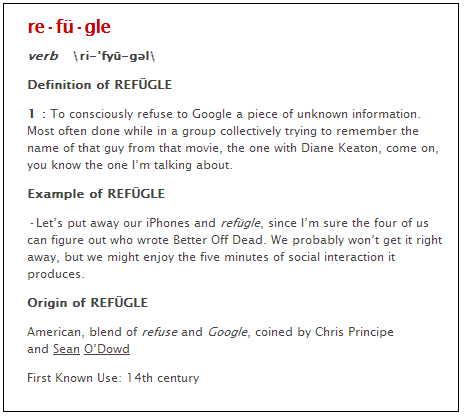A good friend of mine, writer and comedian Chris Principe, recently created a phrase on his blog that I think gets to the heart of one of the unintended consequences of Google:
I think Mr. Principe hits the nail on the head; having immediate access to information can kill social interaction. While the answer to most debates can be found via a Google search, which in many cases will send you to an entry in Wikipedia, Yelp and other social sites, I think it’s likely that relying on Google closes you off to possibilities that might be more valuable than your original goal.
Obviously, if you’re bleeding from the head, it’s a good idea to forgo a debate with your friends and just check online for the nearest emergency room. The same goes for converting Fahrenheit into Centigrade (or even looking up how to spell Fahrenheit when you’re best guess is unrecognizable to spell-check). The point is that you don’t always have to rely on Google because Google might not be able to offer you what you were genuinely looking for in the first place. The only way to know for sure is to refugle.
Refugling might also be a key factor in enterprise social networking. Several years ago, I worked for a startup that helped clients connect and establish relationships with social media “influencers.” I put influencers in quotes not because I think they don’t exist – that’s an entirely different blog post – but because I’m not really sure if the people we connected them to always had the greatest influence in their respective communities. Some of the many tools and services that exist now for determining the identity of influencers were available at the time, but many were expensive or didn’t really produce results that can really be considered valuable. It’s not like we could refer every single client to Robert Scoble and Guy Kawasaki. Often, and I’m not too happy to admit this, we turned to Google. Phrases like “most influential bloggers” were searched on more than one occasion. And while we always did due diligence to ensure that we were giving our clients the names of top-notch bloggers with measurable influence, I always felt that we were missing something.
I didn’t know it at the time, but we should have refugled. My team and I should have asked people in our various circles and online communities what they thought, not a search engine. If we wanted to find out who the most influential alternative energy bloggers were, we should have asked our friends and former coworkers in the alternative energy field what they thought. I’m sure there would have been plenty of overlap, but sparking a conversation could have taken us in directions we’d never thought of on our own.
It’s probably not a good idea to flood your company’s ESN with every single question that comes to mind, especially ones that don’t have much to do with work. But if you’re exclusively relying on Google instead of your company’s collective intelligence, even if you find the answer to your question, you’re missing out on all kinds of opportunities.

